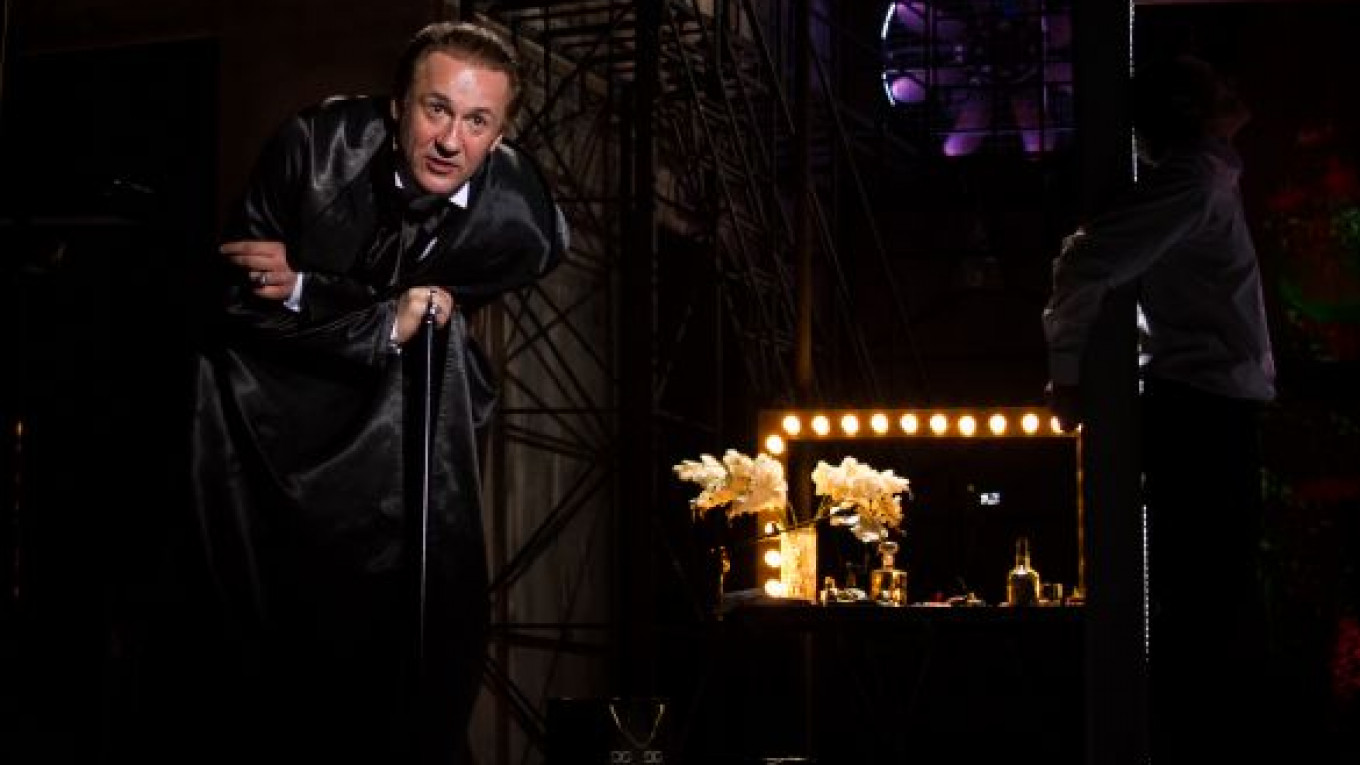It has been a year since star actor Oleg Menshikov took over the Yermolova Theater, and a further five months since he reopened the venerable old venue with a new repertoire. Now, for the first time, he has taken to the stage himself in a new production: A dramatization of Oscar Wilde's novel "The Picture of Dorian Gray."
You can sense a certain statement in the choice of material — Wilde's claim in the preface that "all art is quite useless" is not only self-deprecatingly spoken from the stage at the Yermolova, but is embodied in much of what transpires in the play.
Art may be useless but it does not come without consequences. That is true of Wilde's novel, about a hedonistic man who does not age, while a portrait painted of him grows increasingly grotesque. People's lives are destroyed for the sake of art, and for the Yermolova's production by Alexander Sozonov, which is extremely artistically ambitious.
I found the first half hour of this show to be exhilarating at times. Sozonov, working with video artists Yan Kalnberzin and Yevgeny Afonin and video technicians Alexei Beresnev and Yelena Marchenko, creates some of the most impressive technological scenes I have seen employed in recent years.
Using green screens and multiple video cameras, the director shatters the traditional spatial unity of the stage. Characters are viewed from multiple angles. They stroll together through London streets, an artist's workshop, or a detailed puppet house. The portrait of the young Dorian Gray is a pulsing video creation of light rays.
Before we even get that far, the production begins with throbbing music attributed to VTOL and complex lighting arrangements by Andrei Abramov. Their work accompanies the first appearance of Menshikov in the role of the Mephistophelian Lord Henry, an enigmatic man who mentors Gray with provocative ideas of amorality. He sits in a wheelchair and pontificates on art and beauty rather like some aesthetically-oriented Stephen Hawking.
It is all big, intriguing and effective. You wonder if this show might take off like some futuristic rocket ship and transport us someplace we have never been.
Sozonov frequently keeps the crowd scenes segregated off to one side while literally projecting them into the action by way of video feeds, to immense effect. And Dorian's "sitting" for the portrait by his friend, the artist Basil, is witty — Dorian runs like mad on a treadmill until the whole computer-video contraption recording him eventually overheats to the point of crashing.
But despite some fine performances by the principle actors, this "Dorian Gray," like that treadmill, shudders to a halt before its time.
Primarily, this happens because Sozonov falls back into the rut of psychological theater to narrate the rest, despite his remarkable use of technology to expand early scenes in new and interesting ways. Even when this is done acceptably, we cannot escape the sensation that we have been deceived. It still isn't clear to me why, after such a magnificent start, this show rolls up almost all its technological prowess and throws it aside.
Yes, the final "meeting" with the grotesque portrait — a monstrous computer image based on the movements of Menshikov's Lord Henry — is effective again. But the trust we had, and the opportunity that this show promised, has already passed.
Still, this show has its memorable aspects.
Yaroslav Ros turns in a fine performance as the incorruptible artist Basil. Quirky, sincere and very much a modern, hip creator, he is a fine foil for Menshikov's jaded Lord Henry. As Dorian Gray, Sergei Kempo is a recognizable society climber, but one who exhibits no small amount of charm. He makes a wild and crazy entry as a rapper and his naХvety, before it is crushed by his vanity, is believable.
Menshikov plays Lord Henry with rich nuances that make him both appealing and sinister at once. He easily inhabits a character who is a cold experimenter with people's souls, his own included, and imparts an ease and amiability to this intellectual figure. Is this Lord Henry just bored or does he really want to know what makes human beings tick? It ultimately doesn't matter, for it adds up to a convincing portrait of human paradox in action.
These are the successes we cling to in "The Picture of Dorian Gray" as we lament the fact that such a fascinating beginning was cut loose and abandoned.
"The Picture of Dorian Gray" (Portret Doriana Greya) plays May 13, 14, 29 and 30 at 7 p.m., at the Yermolova Theater, located at 5/6 Tverskaya Ulitsa. Metro Okhotny Ryad. Tel. 495-629-0594. . Running time: 3 hours, 15 minutes.
Contact the author at jfreedman@imedia.ru
Related articles:
A Message from The Moscow Times:
Dear readers,
We are facing unprecedented challenges. Russia's Prosecutor General's Office has designated The Moscow Times as an "undesirable" organization, criminalizing our work and putting our staff at risk of prosecution. This follows our earlier unjust labeling as a "foreign agent."
These actions are direct attempts to silence independent journalism in Russia. The authorities claim our work "discredits the decisions of the Russian leadership." We see things differently: we strive to provide accurate, unbiased reporting on Russia.
We, the journalists of The Moscow Times, refuse to be silenced. But to continue our work, we need your help.
Your support, no matter how small, makes a world of difference. If you can, please support us monthly starting from just $2. It's quick to set up, and every contribution makes a significant impact.
By supporting The Moscow Times, you're defending open, independent journalism in the face of repression. Thank you for standing with us.
Remind me later.







